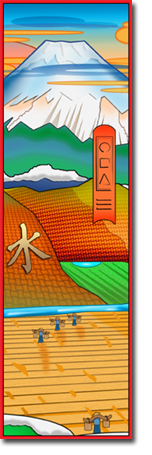On The Way: The Daily Zen Journal
Admonitions
Kuei-shan (771-854)
As long as you are subject to a life bound by force of habit, you are not free from the burden of the body. The physical being given you by your parents has come into existence through the interdependence of many conditions; while the basic elements thus sustain you, they are always at odds with one another.

Impermanence, aging, and illness do not give people a set time. One may be alive in the morning, then dead at night changing worlds in an instant. We are like the spring frost, and like the morning dew, suddenly gone. How can a tree growing on a cliff or a vine hanging into a well last forever? Time is passing every moment; how can you be complacent and waste it, seeing that the afterlife is but a breath away?
Inwardly strive to develop the capacity of mindfulness; outwardly spread the virtue of uncontentiousness. Shed the world of dust to seek emancipation. Over the ages you have followed objects, never once turning back to look within. Time slips away; months and years are wasted.
The Buddha first defined precepts to begin to remove the veils of ignorance. With standards and refinements of conduct pure as ice and snow, the precepts rein in and concentrate the minds of beginners in respect of what to stop, what to uphold, what to do, and what not to do. Their details reform every kind of crudity and decadence.

How can you understand the supreme vehicle of complete meaning without having paid heed to moral principles? Beware of spending a lifetime in vain; later regrets are useless.
If you have never taken the principles of the teachings to heart, you have no basis for awakening to the hidden path. As you advance in years and grow old, your vanity will not allow you to associate with worthy companions; you know only arrogance and complacency.
Dawdling in the human world eventually produces dullness and coarseness. Unawares, you become weak and senile; encountering events, you face a wall. When younger people ask you questions, you have nothing to say that will guide them. And even if you have something to say, it has nothing to do with scriptures. Yet, when you are treated without respect, you immediately denounce the impoliteness of the younger generation. Angry thoughts flare up, and your words afflict everyone.

Our regret is that we were all born in an era of imitation. The age of saints is distant, and Buddhism is decadent. Most people are lazy.
Good Companions
On a long journey, it is essential to go with good companions; purify your eyes and ears again and again. When you stay somewhere, choose your company; listen to what you have not heard time and again. This is the basis of the saying, “It was my parents who bore me; it was my companions who raised me.”
Companionship with the good is like walking through dew and mist; although they do not drench your clothing, in time it becomes imbued with moisture. If you cleanse the mind and cultivate virtue, conceal your tracks and hide your name, preserve the fundamental and purify the spirit, then the clamor will cease.

If you want to study the Way by intensive meditation and make a sudden leap beyond expedient teachings, let your mind merge with the hidden harbor; investigate its subtleties, determine its most profound depths, and realize its true source.
When you suddenly awaken to the true basis, this is the stairway leading out of materialism. This shatters the twenty-five domains of being in the three realms of existence. Know that everything, inside and outside, is all unreal.
Arising from transformations of mind, all things are merely provisional names; don’t set your mind on them. As long as feelings do not stick to things, how can they hinder people? Leaving them to the all-pervasive flow of reality, do not cut them off, yet do not continue them either. When you hear sound and see form, all is normal, whether in the relative world or in the transcendental absolute, appropriate function is not lacking.
If there are people of middling ability who are as yet unable to transcend all at once, let them concentrate upon the teaching, closely investigating the scriptures and scrupulously looking into the inner meaning.
Have you not heard it said, “The vine that clings to the pine climbs to the heights; only based on the most excellent foundation may there be widespread weal?” Carefully cultivate frugality and self-control. Do not vainly be remiss, and do not go too far. Then in all worlds and every life there will be sublime cause and effect.
Kuei-shan (771-854)
Excerpted from The Five Houses of Zen – trans Thomas Cleary 1997





While we mostly want to hear what to do in practice or life, the admonitions, warnings, and cautionary tales seem more important at times. They are usually extremely difficult to hear well enough to apply them to ourselves. And each of us has our own cautionary tales we have either lived through or witnessed in others.
Learning precepts and principles is a good starting place for beginners, but, in reality, we all have an internal, experience-driven homing device. When we can listen to it, things seem to go well. The challenge is listening in the moment and recognizing that familiar uh-oh or hmmm, however it manifests for you. A fork in the road, now what? A time to pause and put on the brakes.
The more we feel pushed, or rushed, or pressured, the more we need to slow down, take a time out to consider, and make a conscious decision rather than a knee-jerk reaction. And then, even if we do all the things to make that best choice, in reality, we can never see far enough ahead to know what an outcome will be. And ideally, it would be beneficial to make peace with this oddity of life.
Sharing this adventure with you…
Elana, scribe for Daily Zen